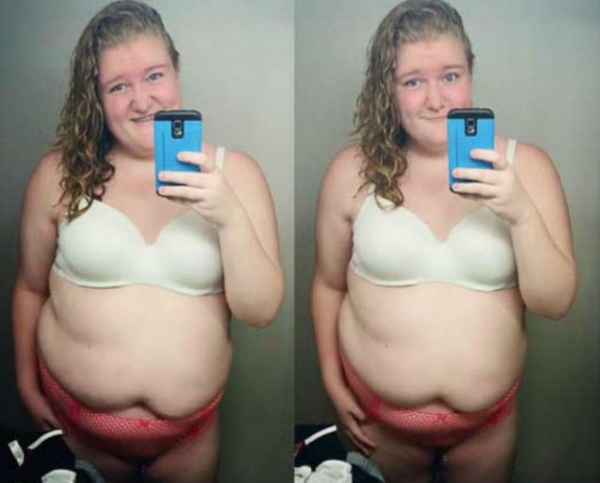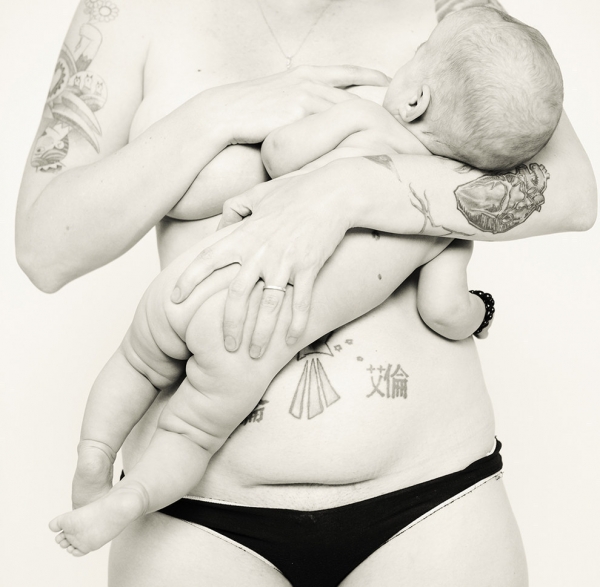If you want to post a picture of yourself — or someone else — on Facebook or Instagram, you better first make sure you’re not too fat, thin, sexy, or maternal. You can wear a bikini in your photo, but only if you look like a celebrity, or actually are one. Definitely don’t post a picture of yourself breastfeeding unless you’re famous. You also can’t post pictures that show your breasts, no matter the circumstances. Unless they’re covered by an itsy-bitsy, teeny-weenie bikini of the color of your choice.
Got all that? Don’t worry, we don’t either. That’s because none of those “rules” are mentioned even remotely in the Terms of Service of Instagram or Facebook.
From Instagram’s Terms of Service:
“You may not post violent, nude, partially nude, discriminatory, unlawful, infringing, hateful, pornographic or sexually suggestive photos or other content via the Service [Instagram].”
From Facebook’s Terms of Service:
“Facebook has a strict policy against the sharing of pornographic content and any explicit sexual content where a minor is involved. We also impose limitations on the display of nudity. We aspire to respect people’s right to share content of personal importance, whether those are photos of a sculpture like Michelangelo’s David or family photos of a child breastfeeding.”
Why then, do you think so many women are complaining of their photos or accounts being deleted for posting photos that comply with the rules, or at least comply with them as much as anyone else’s? Here are some of the most recent examples of ridiculous body-shaming by social media sites.
Nineteen-year-old Samm Newman’s Instagram account was deleted after she posted this near full-body selfie. Shortly after the photo was posted, Instagram suspended her account. While Newman is wearing only bra and underwear, she’s hardly posing provocatively or suggestively.
Newman told her local news stations that she felt there was a double standard on Instagram since her account was deleted while other, thinner girls could post even racier photos without consequence.
5 Films About Body Image Every Woman Should Watch
Instagram responded by reinstating her account and issuing this statement, “When our team processes reports from other members of the Instagram community, we occasionally make a mistake. In this case, we wrongly removed content and worked to rectify the error as soon as we were notified. We apologize for any inconvenience.”
In 2024, more than 20,000 people signed a petition asking Facebook to stop censoring photos of women fighting breast cancer when women began complaining their pictures had been removed. Joanne Jackson, who had set up a photo shoot to celebrate her life post-mastectomy, had her photos taken down for being “offensive.” Fast forward to earlier this year, and Instagram has been accused of doing the same thing.
Celebrities like Scout and Rumer Willis, Rhianna and model Cara Delevingne (who posted a photo questioning why her chest couldn’t be exposed online but a man’s could) have spoken out and posted their own nipple-bearing pictures in protest, starting the #FreetheNipple movement.
Scout Willis said of the movement, “What began as a challenge to Instagram and its prejudiced community guidelines became an opportunity for dialogue. Matters like the taboo of the nipple in the 21st century, public breastfeeding, slut shaming, fat shaming, breast cancer awareness, body positivity, gender inequality, and censorship have found their way into mainstream discussion.”
When Did We Let Fat Shaming Become OK?
In May, in response to the #FreetheNipple movement, Facebook lifted its ban on exposed nipples in breastfeeding pictures. That’s great news for new moms who want to share “content of personal importance” such as “family photos of a child breastfeeding.”
Last week the photo project 4th Trimester Bodies, which shows women’s bodies post-pregnancy, announced its photos are still being removed from its Facebook and Instagram pages. Without warning, the photos are taken down even though they comply with the revised Facebook photo guidelines.
Project founder Ashlee Wells Jackson said they first noticed the problem of disappearing photos last year, and it has only continued. She also said that while her photos disappear, pictures that are far more risqué are allowed to remain. Photos posted by celebrities depicting breastfeeding or partial nudity of themselves or their children are also allowed to remain on social media.
“They don’t take that stuff down,” she said in a statement. “But they seem to have a problem with women showcasing themselves in a nonsexual way.”
This led her to start the #StopCensoringMotherhood campaign, bringing light to the issue of social media censorship of bodies that are less than perfect. Today, the 4th Trimester Bodies Facebook page is back up and running, but their Instagram page remains disabled.
To raise money for Macmillan Cancer Support, members of the University of Warwick Rowing Society decided to sell calendars that depicted nude team members rowing, sitting on a dock, and in other non-sexual poses showing their hard-earned bodies. The 2024 calendar sales raised 3,000 Pounds ($5000) for the organization. However, when they posted photos from the calendar shoot on the Facebook page created to advertise the calendar, the photos were removed and the page eventually deleted for violating the site’s “nudity and pornography” policy.
Members of the team were angered by the removal of their page as it was one of the only ways to market their calendar to a broader audience. One of the members questioned how a charity calendar could be considered porn, and added that the male rower’s charity calendar photos and page were allowed to remain on the site.
That’s right, male rowers are allowed to post nude photos from a charity calendar, but if you’re a female, you better cover up. At least, that’s what Facebook appears to be telling its users.
Happily, the rowers aren’t letting their Facebook problems impede their fundraising. The 2024 calendar has already been shot, and they are advertising it on platforms like Twitter @nakedgirlsrow.
Through all of these tales of censorship, prejudice and sexism, one thing is certain — social media needs to get its act together when it comes to women’s bodies. Big or small, famous or not, naked or clothed, our bodies should be celebrated and shouldn’t be shamed.
Images from Instagram, Ross Parry, 4thTrimesterBodies.com, Twitter
Also Read:
3 Body Image Power Songs Every Woman Needs to Hear (and Believe) Right Now
Facebook Can (and Maybe Already Did) Mess With Your Mood
“My Body Gallery” Aims to Deconstruct Body Image Insecurities in Women





